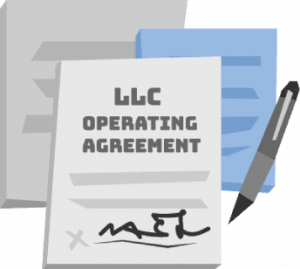How to Start a Limited Liability Company in Georgia
To start a limited liability company (LLC) in Georgia, you’ll need a business name, a Georgia registered agent, and to file Georgia Articles of Organization with the Secretary of State. Georgia charges a $105 for form your LLC online, and $110 if you file by mail.
Our guide takes you through the steps of forming a Georgia LLC.

1. Name Your LLC
Before you form your LLC in Georgia, it needs a name. You should make sure the business name you want fits the requirements listed in Code of Georgia § 14-11-207. The name must:
- Include limited liability company, limited company, L.L.C., L.C., LLC, or LC.
- Be a unique business name in Georgia—distinguishable from any other business registered in the state.
- Not include restricted words like “insurance” or “university” without approval.
- Be no more than 80 characters long (including spaces and punctuation).
Already have a great name in mind? Use our free Georgia Business Name Search to check its availability. If your LLC name is unclaimed, but you’re not ready to file the paperwork, you can reserve that name for 30 days by submitting a Name Reservation Request and paying the $30 online filing fee ($35 for paper filings).
If you need to change your LLC’s name in the future, you can do that by filing Articles of Amendment to Articles of Organization. There’s a $25 fee when filing an amendment online, $30 by mail.
You also have the option of getting Georgia DBA if you want to conduct business under a different name. A DBA (doing business as) name lets a business operate under another name while retaining its registered legal name. Georgia DBAs (which are also called trade names) are registered with the Clerk of Superior Court in the county where your business chiefly operates. The cost of a DBA varies by county.
Georgia also requires that any business registering for a DBA must publish notice of that registration at least once a week, for a minimum of two weeks. Notice must be published in the newspaper used for sheriff’s office legal advertisements in the county where your business is located. The cost of publication varies depending on the newspaper.
Start Your Georgia LLC Today!


2. Get a Domain Name
A website domain that matches your business name improves search engine visibility, which brings more customers to your business. Northwest makes it easy and can get you a domain instantly. In fact, all of our LLC customers get:
- One year of free domain registration.
- A customizable business website that’s kept safe with top-shelf SSL security.
- Up to 10 professional business email addresses.
- A business phone number with local area code.
- Friendly Corporate Guides®; have questions about a filing or form? We have answers!

3. Designate a Registered Agent
You are legally required to appoint a registered agent for your Georgia LLC. Registered agents accept legal mail and service of process on behalf of a business. Your Georgia registered agent may be an individual or a registered agent company like Northwest, and must:
- Have a physical address (no P.O. Boxes) in Georgia.
- Accept legal notices for your business and get them to you fast.
Registered agents are expected to maintain regular business hours on weekdays to be available when service of process is delivered.
Why choose Northwest as your registered agent?
At Northwest, one of our main goals is to help LLC owners live more privately. As your Georgia registered agent, not only will we list our office address on your LLC formation paperwork, you’ll have the option of adding Georgia Virtual Office Service to your order.
With a virtual address, you’ll be able to run your business from home without worrying about putting your personal address on your business cards or website. Need a mail solution? Our Georgia Virtual Office Service allows you to choose between receiving same-day digital mail scans or weekly physical mail forwarding.
Want more? Our Virtual Office customers also get access to our feature-packed Phone Service. You’ll get a local Georgia phone number that you can use to keep your personal number away from the prying eyes of spammers and scammers.
Yes. You can be your own registered agent in Georgia if you don’t mind having your name and address on public documents and being available to accept service of process at the registered office you designate in your LLC formation documents. But many business owners choose to hire a registered agent service like Northwest instead.
Yes. To change your registered agent in Georgia, file an Annual Registration form with the Secretary of State and pay the $55 online filing fee ($60 for mailed forms).

4. Submit LLC Articles of Organization
The process of forming your Georgia LLC differs based on how you file its documentation. When filing a paper form, you’ll fill out a short Articles of Organization form with the Georgia Secretary of State’s Corporations Division, along with a Transmittal Form that asks for more detailed information.
When you file your Articles of Organization online, you’ll file a single long form that combines the information from the print versions of the Articles of Organization and the Transmittal Form, with the option of answering a few additional questions.
All information on these forms becomes part of the public record, with the exception of your LLC’s business email address.
To complete your Georgia Articles of Organization, provide the following information:
- Company name. Must include an indicator like LLC.
- Effective date. The date your Articles of Organization become effective, either when filed with the Secretary of State, or a date within 90 days of your filing date.
- Signature. The dated signature of the organizer, member, manager, or attorney-in-fact of the LLC who has filed this document.
The Transmittal Form requires this additional information:
- Primary email address. The email address where the Corporations Division can send your LLC’s Certificate of Approval.
- Name reservation number. If you’ve previously submitted a Name Reservation Request, list its identification number. Otherwise, leave this blank.
- Filer’s address, email and phone number. Contact information for the person that filed the Articles of Organization.
- LLC’s principle office mailing address. This address may be a P.O. Box.
- Registered agent. Whoever you designate to receive legal notices for your business.
- Registered office address. A physical street address in Georgia.
- Registered agent email address. The email address your registered agent can be reached at.
- Organizer info. Name and physical address of each organizer responsible for filing LLC paperwork with the state.
For online filers, the combined Articles of Organization and Transmittal Form form contains the above information, plus three optional questions:
- Name approval document. If your LLC’s name includes restricted words like “credit union” or “college,” attach an approval letter from the relevant agency. Most LLC names don’t need approval and can leave this blank.
- Business purpose. You can choose a NAICS Code that fits your business, or enter “unknown” or “any legal purpose” if you’d rather not specify.
- Optional provisions. If there is any additional information you want included (like member and manager details), add or attach it here.
It costs $105 to file Georgia LLC Articles of Organization online. Paper filings cost $110.
Georgia usually processes online and hand-delivered LLC filings in 7 business days. Mailed filings are processed in 10-15 business days. Expedited processing is available: two-day processing for $120, same-day for $275, and if you don’t like money, one-hour for $1,200.
You can file with the Georgia Corporations Division online, by mail, or in person.
Mail or in person:
Georgia Secretary of State
Corporations Division
2 Martin Luther King Jr. Dr. SE
Suite 313 West Tower
Atlanta, Georgia 30334
Online:
Georgia Corporations Division
Note: All online filers will need an account with Georgia’s Corporations Division.
In general, Georgia’s low fees for forming and maintaining an LLC make it an appealing place to form your LLC. In addition, the state offers an array of incentives for businesses (like Georgia Enterprise Zones, where businesses are eligible for tax exemptions or reduction and lower regulatory fees) and business tax credits that in-state LLCs can benefit from.
Most of the information on your Articles of Organization and accompanying documents becomes publicly accessible, making it a potential target for spam and scams. Using a registered agent service can help you protect your information.
Hire us and we’ll use our business address on your Articles of Organization, while you keep yours private.
Your Georgia LLC Is Formed. What's Next?

Write an LLC Operating Agreement
An operating agreement is an internal document that helps govern your Georgia LLC’s operations. It’s where members decide on the LLC’s rules for things like voting, transferring membership interest, and what conditions will dissolve the business.
Use our free Georgia LLC Operating Agreement Template.
In Georgia, LLCs are not required to have an operating agreement, but without one, your business must follow Georgia’s default LLC operation laws. An operating agreement is also usually necessary for opening a business bank account.
Yes. Banks usually require all LLCs (even single-member LLCs) to provide an operating agreement before opening a business account. An operating agreement can also help a single-member LLC in court by showing that the business is a distinct entity with its own rules and proceedings.

Get an EIN, Bank Account & Funding
In most cases, your Georgia limited liability company will need its own bank account to keep its funds separate from those of members and help maintain its limited liability. Opening a business bank account means getting an EIN (unless you’re a single-member LLC and trust others with your social security number). An EIN is like a social security number for your business, which the IRS can use to identify your LLC on tax filings.
Once the LLC has a business bank account, you can fund it. Members make an initial contribution (usually money, but sometimes property or services) that determines their “membership interest,” or percentage of LLC ownership.
You can get an EIN for free from the IRS, or simply hire Northwest to obtain your EIN

File Taxes & Reports
Georgia LLCs have certain tax and reporting obligations. Members should be aware of:
- Taxes: By default, Georgia LLCs are pass-through entities like sole proprietorships and general partnerships. Like those entities, LLC profits “pass through” the business to its members, and the LLC itself does not pay income taxes on those profits. However, the members must report their portion of the LLC’s profits on their own tax returns, where it becomes subject to the 15.3% federal self-employment tax rate.
- Annual Registration: Your Georgia LLC needs to submit an Annual Registration to Georgia’s Corporations Division. Your Georgia Annual Registration updates the state about changes to your LLC’s ownership and contact information. You also have the option of filing multi-year registration for two or three years at once. Worried you’ll forget? Keep things simple and hire Northwest to file for you.
Yes. Each year your Georgia Annual Registration costs $55 to file online, and paper filings cost $60. There is no discount for filing multi-year registrations.
LLCs in Georgia are taxed as pass-through entities by default, but may elect to file for S-corp or C-corp tax status with the IRS.
Learn more about S-Corp vs LLC tax designation.
*This is informational commentary, not advice. This information is intended strictly for informational purposes and does not constitute legal advice or a substitute for legal counsel. This information is not intended to create, nor does your receipt, viewing, or use of it constitute, an attorney-client relationship. More information is available in our Terms of Service.

